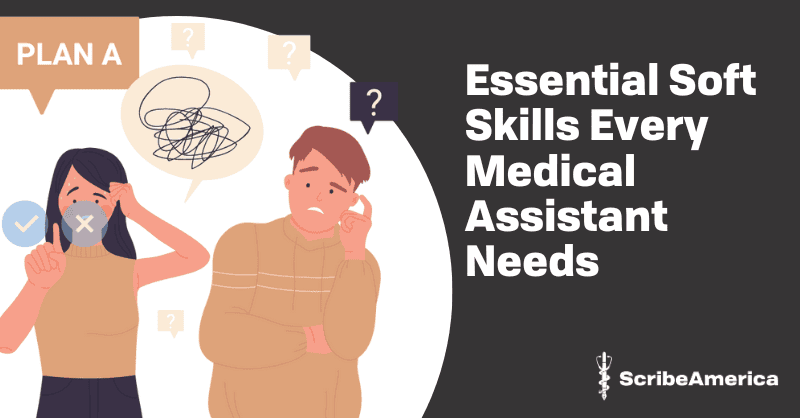Starting your career as a medical assistant requires certain hard and soft skills. While it is unsurprising that they need to be capable of performing simple laboratory tests or preparing patients for examination, have you ever considered what other competencies they should have? If not, read this article – here we will focus on the soft skills for a medical assistant.

Medical Assistant Soft Skills List
Knowing who a medical assistant is, you may expect this list to be long. After all, although medical assistants share a part of their responsibilities with medical scribes, the core of their work is direct contact with patients. So, which soft skills are vital for medical assistants?
- Empathy – The first on the list is empathy. Since medical assistants often prepare patients for the examinations, they are likely to ask a few questions and hear at least the initial part of the patient’s story. Thus, they need to be able to show compassion.
- Communication – Effective communication with patients is a must for physicians, but also for medical assistants. Knowing which questions to ask, what tone and body language to use, and finally the ability to identify potential fears and resolve conflicts – this the cornerstone for both of these professions.
- Teamwork – Cooperation with other employees is important in most companies and professions, but for medical assistants this skill is critical. The better they work with physicians, scribes, nurses, and administrative workers, the quicker the processes are. This results in higher productivity, fewer occupied hospital beds, and even better treatment.
- Stress management – A person’s life is on the line? There’s no time to hesitate. A medical assistant will often be put into the center in rapidly changing, stressful situations. If they want to handle them and help people, they cannot be consumed by anxiety and should be able to reforge their stress into a positive power or cut off from it completely.
- Problem-solving – This medical assistant skill works for medical assistance in two dimensions: internal and external. Issues that emerge may be either connected to the processes within the facility or the patients themselves, and a medical assistant will often find themself in the middle. Thus, being able to quickly find solutions is an ability that will help medical assistants a lot.
- Flexibility and adaptability – A medical assistant’s role is wide. It consists both of clinical and administrative duties. Therefore, a candidate for such a position needs to be able to adapt and work in different environments. After all, they might be preparing the patients, performing laboratory tests, and filling out medical documentation on the same day.
- Confidence – Would you trust a doctor who seems unsure of themself? You would probably question their decisions multiple times – that’s natural. The same case is with medical assistants. Therefore, they have to be confident – otherwise, they may quickly lose patients’ trust.
Skills for Medical Assistant - The Takeaway
We hope that we have helped with our overview of the soft skills required for the medical assistant profession. While this job is no cakewalk, it’s really rewarding and will give you true satisfaction, so we strongly recommend it.
Don’t want to be a medical assistant anymore? Check our job offers – perhaps you’ll become a medical scribe or a remote transcriptionist?




